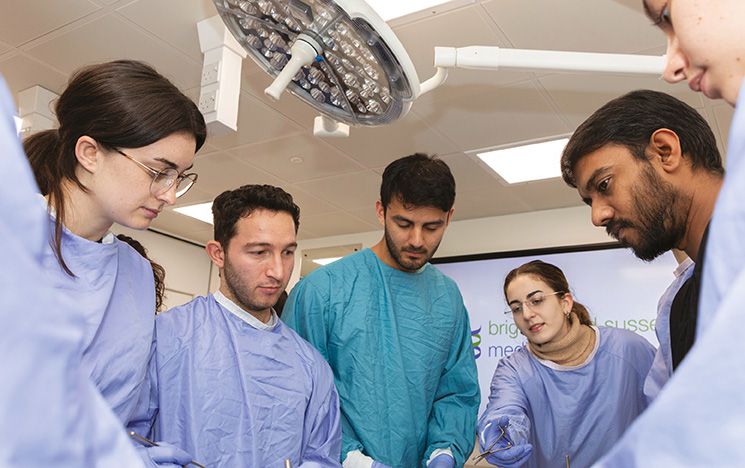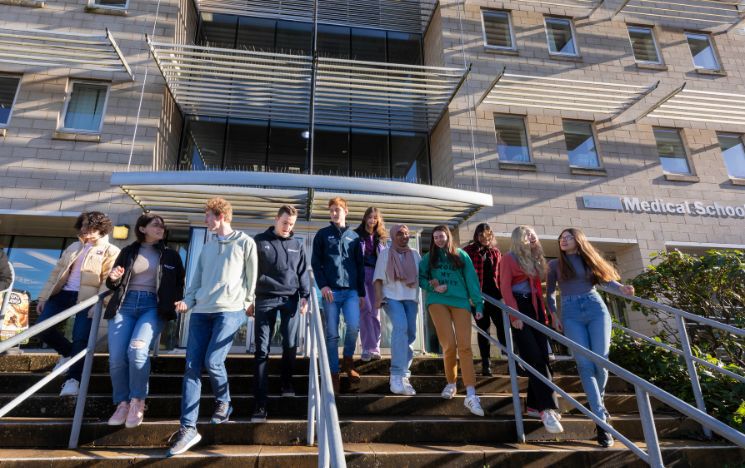Many healthy returns
Since welcoming its first cohort in September 2003, Brighton and Sussex Medical School (BSMS) has graduated more than 2,000 doctors to work in the NHS and beyond. Alongside 20 postgraduate courses, groundbreaking new programmes and transformative research, the school is in good health two decades on.
The early days
Professor Jonathan Cohen, founding Dean of BSMS, remembers the pressure before it opened. “We had about 15 months before the first students turned up – and everything to do,” he says. “We had to plan the curriculum, build the buildings, recruit the staff and choose the colours for the academic gowns. It was an incredibly exciting time.”
Dr Sophie Harrison (Bachelor of Medicine, Bachelor of Surgery 2003), who formed part of the first cohort, is today a GP and author. “When I began in 2003, BSMS was brand new. The window glass sparkled, the lecture theatre smelt like the inside of a new car and there wasn’t a single chewing gum splat on the stone steps,” she recalls. “These were primitive times. Smart phones weren’t very smart, the Internet wasn’t the default and we still carried textbooks around.
“While studying in my bedsit on Ship Street, I somehow lost track of the descending limb of the loop of Henle, distracted by the seagulls on a nearby rooftop. My class graduated on a hot day in 2008. I still couldn’t tell you much about the loop of Henle, but I did learn a million unexpected things. BSMS showed me that much of what we need to know is not found in books.”
Innovative teaching
BSMS has developed and rolled out two groundbreaking programmes to help develop future doctors’ skills and empathy in working with patient groups who may face difficulties in accessing healthcare. The Time for Dementia (TfD) programme pairs second-year students with families affected by the condition, who they visit regularly over two years.
Harriet Kwartemaa is in her fourth year at BSMS. “Time for Dementia was an amazing two years,” she says. “I had the chance to interact with both the individual and their family, which boosted my confidence in working with people with dementia. Throughout medical school we learn about the science behind the disease, but TfD provides first-hand experience – especially for those who have had little interaction with individuals with dementia and their caregivers.”
Since its inception 10 years ago, the TfD programme has been implemented in other higher education institutions across the South of England, with around 8,000 students and 2,100 families taking part. On the back of its success, Time for Autism launched in 2021, pairing students with families who have an autistic family member.

Transformative research
Research at BSMS has flourished over the past 20 years, receiving national and international recognition in multiple areas of research, including neuroscience, paediatrics and haematological cancers, global health and infection.
Professor Mahmood Bhutta leads research at BSMS that looks at making healthcare more sustainable in terms of both its environmental impact and labour rights in global supply chains. “We need to understand what the barriers are to re-using medical products, including the current economic model and a lack of evidence around infection control, meaning that people will dispose of items rather than consider reusing them, for fear of infection risk,” he says. “There are also issues with the supply chain for medical products, including the production of gloves using forced labour in Malaysia and PPE production in China. In northern Pakistan, I’ve even seen children as young as seven working on grinding machines to make products for the NHS.
“If we move to an economy where just about everything is reused, we will reduce our environmental impact in many different ways,” he adds. “We’re also likely to save the NHS millions of pounds each year. I hope we embed a culture where the medical goods that we buy must protect worker rights.”
I had the chance to interact with both the individual and their family, which boosted my confidence in working with people with dementia.”
The next decade
Professor Malcolm Reed, who has been the school’s Dean for the past decade, believes there are great things ahead. “BSMS is now an established school with clearly recognised strengths in several research areas where we make significant contributions to knowledge and practice,” he says. “These will consolidate and grow in the coming years, enhancing our reputation in discovery science and increasing participation for patients and public in important clinical research studies.
“The new NHS Long Term Workforce Plan sets an incredibly ambitious objective to double the number of medical student places in the UK,” he adds. “The appointment of a new Dean to lead BSMS into the next decade will be an exciting time, and I am sure they will enjoy the opportunity to help shape this wonderful medical school as much as I have done over the past 10 years!”
